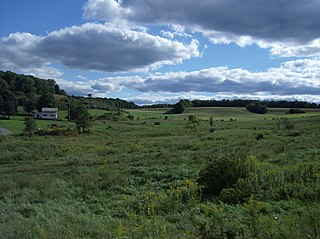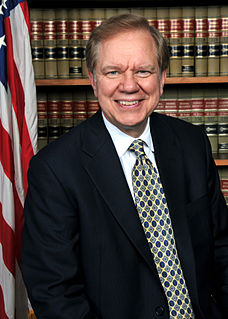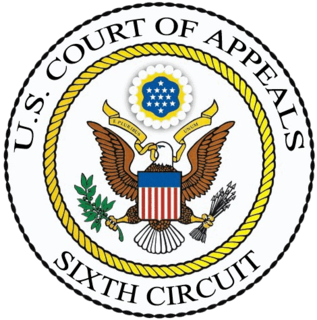
The open-fields doctrine, in the U.S. law of criminal procedure, is the legal doctrine that a "warrantless search of the area outside a property owner's curtilage" does not violate the Fourth Amendment to the United States Constitution. However, "unless there is some other legal basis for the search," such a search "must exclude the home and any adjoining land that is within an enclosure or otherwise protected from public scrutiny."
United States v. Verdugo-Urquidez, 494 U.S. 259 (1990), was a United States Supreme Court decision that determined that Fourth Amendment protections do not apply to searches and seizures by United States agents of property owned by a nonresident alien in a foreign country.
Florida v. Riley, 488 U.S. 445 (1989), was a United States Supreme Court decision which held that police officials do not need a warrant to observe an individual's property from public airspace.
Dennis G. Jacobs is a Senior United States Circuit Judge of the United States Court of Appeals for the Second Circuit. He previously served as Chief Judge of the Second Circuit from October 1, 2006 to August 31, 2013.
Oliver v. United States, 466 U.S. 170 (1984), is a United States Supreme Court decision relating to the open fields doctrine limiting the Fourth Amendment to the United States Constitution.
United States v. Dunn, 480 U.S. 294 (1987), is a U.S. Supreme Court decision relating to the open fields doctrine limiting the Fourth Amendment of the U.S. Constitution.
United States v. Hatch, 931 F.2d 1478, cert. denied, 502 U.S. 883 (1991) is a United States Court of Appeals for the Eleventh Circuit court decision relating to the open fields doctrine limiting the scope of the Fourth Amendment of the U.S. Constitution.
United States v. Pace, 955 F.2d 270, cert. denied, 502 U.S. 883 (1992) is a United States Court of Appeals for the Fifth Circuit court decision relating to the open fields doctrine limiting the scope of the Fourth Amendment of the U.S. Constitution.

Thomas Lee Ambro is a United States Circuit Judge of the United States Court of Appeals for the Third Circuit. He began his judicial service in 2000.
Inevitable discovery is a doctrine in United States criminal procedure that permits admission of evidence that was obtained through illegal means if it would "inevitably" have been obtained regardless of the illegality. It is one of several exceptions to the exclusionary rule, or the related fruit-of-the-poisonous tree doctrine, which prevent evidence collected in violation of a defendant's constitutional rights from being admitted in court.
United States v. White, 401 U.S. 745 (1971), was a United States Supreme Court decision which held that recording conversations using concealed radio transmitters worn by informants does not violate the Fourth Amendment protection against unreasonable searches and seizures, and thus does not require a warrant.
Mancusi v. DeForte, 392 U.S. 364 (1968), is a decision of the United States Supreme Court on privacy and the Fourth Amendment. It originated in the lower courts as United States ex rel. Frank DeForte, appellant v. Vincent R. Mancusi, Warden of Attica Prison, Attica, New York, appellee, a petition for a writ of habeas corpus by a prisoner who had exhausted all his state appeals. By a 6–3 margin the Court affirmed the United States Court of Appeals for the Second Circuit's reversal of a district court denial of the petition.
United States v. Knotts, 460 U.S. 276 (1983), was a United States Supreme Court case regarding the use of an electronic surveillance device. The defendants argued that the use of this device was a Fourth Amendment violation. The device in question was described as a beeper that could only be tracked from a short distance. During a single trip, officers followed a car containing the beeper, relying on beeper signal to determine the car's final destination. The Court unanimously held that since the use of such a device did not violate a legitimate expectation of privacy there was no search and seizure and thus the use was allowed without a warrant. It reasoned that a person traveling in public has no expectation of privacy in one's movements. Since there was no search and seizure there was not a Fourth Amendment violation.

United States v. Pineda-Moreno, 591 F.3d 1212 (2010) was a 2010 Ninth Circuit Court of Appeals case regarding the use of GPS devices. The court ruled that a placing a GPS tracking device a personal vehicle without a warrant did not violate a suspect's Fourth Amendment rights, even if the vehicle was parked in the defendant's driveway at the time the device was placed. The case was reversed and remanded by the United States Supreme Court in light of United States v. Jones.
United States v. Jones, 565 U.S. 400 (2012), was a landmark United States Supreme Court case which held that installing a Global Positioning System (GPS) tracking device on a vehicle and using the device to monitor the vehicle's movements constitutes a search under the Fourth Amendment.
Soldal v. Cook County, 506 U.S. 56 (1992), was a United States Supreme Court case in which the Court held that a seizure of property like that which occurs during an eviction, even absent a search or an arrest, implicates the Fourth Amendment. The Court also held that the Amendment protects property as well as privacy interests, in both criminal as well as civil contexts. Finally, saying that "certain wrongs affect more than a single right", the Court left open the possibility that the Fourteenth Amendment's protections against deprivation of property without due process of law may also be implicated.

Woollard v. Sheridan, 863 F. Supp. 2d 462, reversed sub. nom., Woollard v Gallagher, 712 F.3d 865, was a civil lawsuit brought on behalf of Raymond Woollard, a resident of the State of Maryland, by the Second Amendment Foundation against Terrence Sheridan, Secretary of the Maryland State Police, and members of the Maryland Handgun Permit Review Board. Plaintiffs allege that the Defendants' refusal to grant a concealed carry permit renewal to Mr. Woollard on the basis that he "...ha[d] not demonstrated a good and substantial reason to wear, carry or transport a handgun as a reasonable precaution against apprehended danger in the State of Maryland" was a violation of Mr. Woollard's rights under the Second and Fourteenth Amendments, and therefore unconstitutional. The trial court found in favor of Mr. Woollard, However, the Fourth Circuit Court of Appeals reversed the trial court and the U.S. Supreme Court declined to review that decision.

Florida v. Jardines, 569 U.S. 1 (2013), was a United States Supreme Court case which resulted in the decision that police use of a trained detection dog to sniff for narcotics on the front porch of a private home is a "search" within the meaning of the Fourth Amendment to the United States Constitution, and therefore, without consent, requires both probable cause and a search warrant.

In Taylor v. City of Saginaw, et al., No. 17-2126, the United States Court of Appeals for the Sixth Circuit held that the practice of “chalking” in which parking enforcement officers apply chalk to mark the tires of parked vehicles in order to track the duration of time for which those vehicles have been parked, constitutes a search under the Fourth Amendment to the United States Constitution. The court also held that two exceptions to the search warrant requirement—the community caretaker exception and the motor vehicle exception offered by the government—do not apply to the practice of chalking tires. Taylor v. City of Saginaw is the first case in which chalking was alleged to violate the Fourth Amendment.
Stone v. Powell, 428 U.S. 465 (1976), was decision of the Supreme Court of the United States that limited which claims of Fourth Amendment violations could be made by state prisoners in habeas corpus petitions in federal courts. Specifically, a claim that the exclusionary rule had been broken would be barred if state courts had already given it a full and fair hearing. The decision combined two cases that were argued before the Supreme Court on the same day with similar issues, one filed by Lloyd Powell and the other, titled Wolff v. Rice, filed by David Rice.






